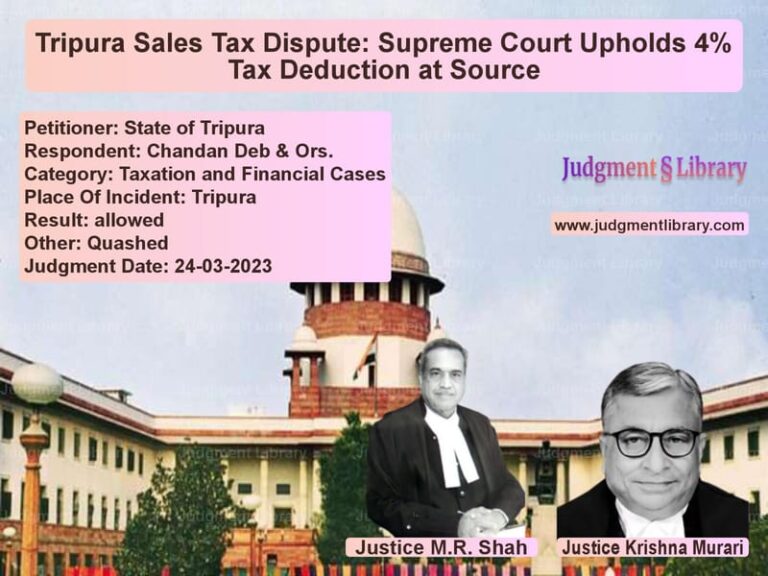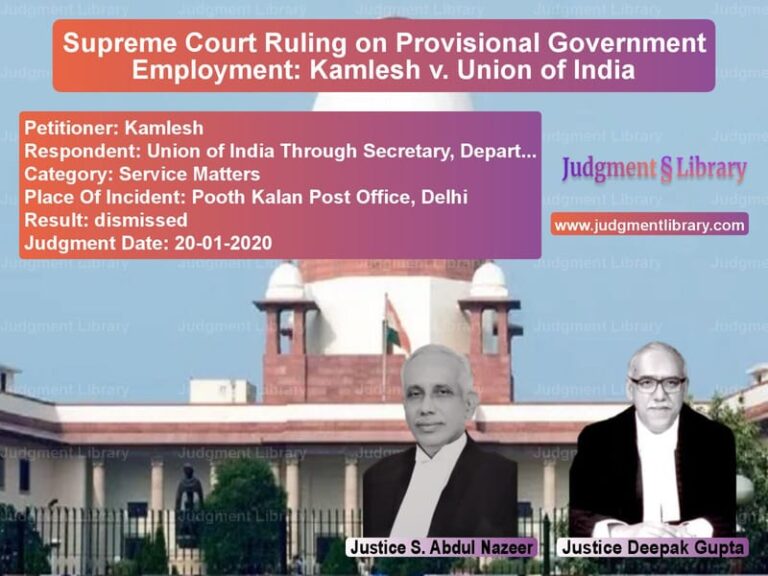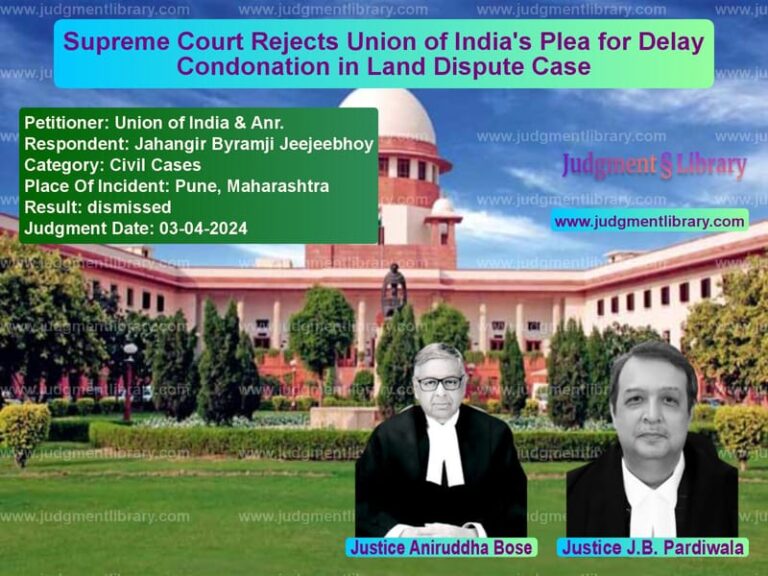Supreme Court Upholds Eviction Order Against Tenant in Tamil Nadu Property Dispute
The Supreme Court of India, in its judgment dated January 28, 2016, in Tmt. Kasthuri Radhakrishnan & Ors. vs. M. Chinniyan & Anr., ruled in favor of the appellants by upholding an eviction order against the respondent. The case revolved around a rental dispute in Tamil Nadu, where the landlord sought eviction on grounds of willful default in rent payment and bona fide need for personal occupation. The ruling overruled a previous High Court decision and reaffirmed that a landlord does not need to implead all co-owners in eviction petitions.
Background of the Case
The appellants—Tmt. Kasthuri Radhakrishnan and her family—were the legal heirs of A. Radhakrishnan, the original owner of the disputed property, located in Erode, Tamil Nadu. The respondent, M. Chinniyan, had occupied the premises as a tenant under a lease agreement dated February 12, 1989. The dispute arose after the tenant refused to vacate, despite defaulting on rent payments and the appellants’ requirement of the property for personal residence.
Key Legal Issues
- Was the tenant in willful default of rent payments?
- Did the landlord have a bona fide need to occupy the premises?
- Was the eviction petition maintainable without impleading all co-owners?
- Could the High Court overturn concurrent findings by lower courts?
Arguments by the Appellant (Landlord)
- The respondent had failed to pay rent since 1989, constituting willful default.
- The appellants had bona fide need for the property as they were living in a rented house in Salem.
- The eviction petition was valid as per the ruling in Dhannalal vs. Kalawatibai, which states that an eviction suit does not require the inclusion of all co-owners.
- The High Court acted beyond its jurisdiction by reappreciating evidence that was correctly assessed by the Rent Controller and the first appellate court.
Arguments by the Respondent (Tenant)
- The tenant had paid rent through power of attorney holder V. Dhanapal, not directly to the appellants.
- The eviction petition was defective as it did not include Tmt. R. Kanjana, another heir of A. Radhakrishnan.
- The appellants had failed to establish a direct landlord-tenant relationship with the respondent.
- The High Court was justified in reviewing its previous order and dismissing the eviction petition.
Supreme Court’s Observations
The Supreme Court examined the rulings of the lower courts and noted that:
- The tenant had not provided adequate evidence to refute the willful default claim.
- The landlord’s bona fide need was established by proof of their residence in a rented house.
- The non-joinder of Tmt. R. Kanjana was not a valid ground for dismissal, per the ruling in Dhannalal vs. Kalawatibai.
- The High Court erred in reappreciating evidence in a revision petition, which is limited to examining procedural errors.
The Court cited the case of Hindustan Petroleum Corporation Limited vs. Dilbahar Singh, reaffirming that High Courts cannot reappreciate factual findings in revision petitions unless there is a gross miscarriage of justice.
Supreme Court’s Ruling
The Supreme Court reversed the High Court’s ruling and upheld the eviction order:
- The tenant’s default was confirmed, and the eviction petition was deemed valid.
- The appellants were granted possession of the property within three months.
- The tenant was directed to deposit any pending arrears of rent and pay three months’ rent as damages.
- The appellants were awarded a cost of Rs.5,000 against the respondent.
Key Takeaways from the Judgment
- Willful default in rent payment is a valid ground for eviction.
- A bona fide need for personal occupation must be based on evidence.
- All co-owners do not need to be impleaded in an eviction petition.
- The High Court cannot reappreciate evidence in revision petitions.
- The ruling strengthens landlord rights under Tamil Nadu rent laws.
Conclusion
The Supreme Court’s ruling in Tmt. Kasthuri Radhakrishnan & Ors. vs. M. Chinniyan & Anr. provides clarity on landlord-tenant disputes under the Tamil Nadu Buildings (Lease and Rent Control) Act. By reinstating the eviction order, the Court reinforced that rent defaults and bona fide landlord requirements justify eviction. This judgment is a significant precedent for future cases involving disputed tenancies and rent control laws.
Don’t miss out on the full details! Download the complete judgment in PDF format below and gain valuable insights instantly!
Download Judgment: Tmt. Kasthuri Radhak vs M. Chinniyan & Anr. Supreme Court of India Judgment Dated 28-01-2016.pdf
Direct Downlaod Judgment: Direct downlaod this Judgment
See all petitions in Property Disputes
See all petitions in Landlord-Tenant Disputes
See all petitions in Judgment by J. Chelameswar
See all petitions in Judgment by Abhay Manohar Sapre
See all petitions in allowed
See all petitions in Quashed
See all petitions in supreme court of India judgments January 2016
See all petitions in 2016 judgments
See all posts in Civil Cases Category
See all allowed petitions in Civil Cases Category
See all Dismissed petitions in Civil Cases Category
See all partially allowed petitions in Civil Cases Category







